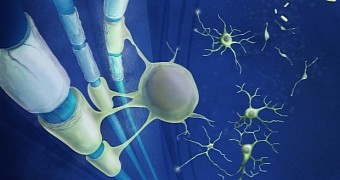Multiple sclerosis, often referred to simply as MS, is a disease that correlates with the inflammation of the insulating covers of nerve cells in the brain and in the spinal cord.
This damage done to the insulating covers of nerve cells takes its toll on the nervous system's ability to properly produce, carry and transmit signals, specialists explain.
As a result, multiple sclerosis patients find themselves experiencing physical, mental and sometimes even psychiatric symptoms. For the time being, there is no cure for this disease.
Oddly enough, two drugs for skin conditions appear to treat it
Having carried out a series of experiments, a team of researchers led by scientists at the Case Western Reserve University in the US found that two drugs developed to treat skin conditions have the potential to address multiple sclerosis.
In a paper published in yesterday's issue of the journal Nature, the specialists detail that the compounds in question go by the name miconazole and clobetasol. The first is a common ingredient in anti-fungal lotions and powders, whereas the latter treats skin conditions such as dermatitis.
As part of their study, the Case Western Reserve University scientists and their colleagues administered these two drugs to laboratory mice suffering from a form of multiple sclerosis. Soon enough, the rodents started feeling better.
Writing in the journal Nature, the researchers behind this investigation detail that the drugs encouraged stem cells in the mice's body to form new insulating covers for their nervous system. In doing so, the compounds improved the multiple sclerosis symptoms the rodents were displaying.
“It was a striking reversal of disease severity in the mice,” scientist Robert Miller commented on the outcome of these experiments. “The drugs that we identified are able to enhance the regenerative capacity of stem cells in the adult nervous system,” he added.
The drugs might also help people diagnosed with multiple sclerosis
The researchers have reasons to believe that miconazole and clobetasol could also prove effective when it comes to treating people suffering from multiple sclerosis. Hence, they plan to further study their effect and then debut clinical trials involving human volunteers.
Presently, efforts to treat multiple sclerosis by repairing damage done to the insulating covers of nerve cells that comprise the brain and the spinal cord focus on figuring out a way to transplant healthy tissues grown in the lab into the body.
The Case Western Reserve University scientists argue that their idea to treat this disease by using drugs to compel the nervous system to regenerate itself is preferable because it is non-invasive and therefore safer for patients. Besides, it eliminates the risk of having the body reject the new tissues.

 14 DAY TRIAL //
14 DAY TRIAL //